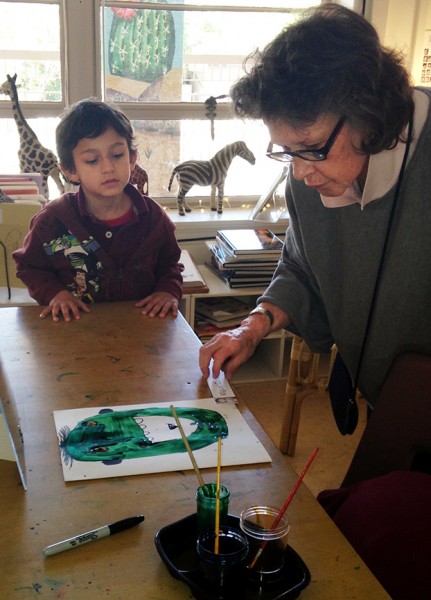
Marian Cuiltre is an 8-year-old with autism. Unable to make the “sss” sound to say “si,” she often responds with her own version—“thee.” She has the potential to speak more completely but has been on a waiting list to be assigned a speech therapist for more than three years now.
Arizona is no exception to the shortage of speech language pathologists in the country, and southern Arizona, with its high percentage of Spanish-speaking families, suffers even more because very few of the already limited number of speech-language pathologists are trained in bilingual speech therapy.
Many Spanish-speaking or bilingual children, therefore, are not getting the speech services they need.
“Children wait on these lists for years,” said Lea Cuzner, a bilingual speech-language pathologist who works for the Child Language Center. “If they need a specialist the wait becomes even longer.”
Maria Olivares, Marian’s mother, knows that first hand. “It’s frustrating and sad because I know I’m not the only one,” she said.
In Tucson alone, there are 265,000 people who speak more than one language at home, only about half of whom “speak English very well,” according to a study by the Pew Hispanic Center.
The effects of not getting speech therapy services as a child can have a long-term impact, including decreased social interaction and poor academic performance, said Jeffery Meeks, president of the Arizona Speech-Language-Hearing Association.
“There are not enough people going into the field,” he said. “We need more to serve our kids.”
Arizona has a more severe shortage of bilingual speech-language pathologists than other states because of its lack of educational programs in the specialty, Meeks said.
The University of Arizona offers the only bilingual speech therapy program in Southern Arizona. The 11-credit certificate program first became available to students at the beginning of the 2013-2014 school year.
Training speech-language pathologists to work with bilingual children is important because without the specialized skill set, therapists often choose not to diagnose bilingual children at all because they feel “uncomfortable,” said Leah Fabiano-Smith, leader of the bilingual speech therapy program at UA.
“What you can end up with is an under-representation of bilingual children receiving speech therapy services,” Fabiano-Smith said.
There are only about 30 bilingual speech therapists in all of Pima County, she said. This is partially attributed to the fact that bilingual speech-language pathology is a relatively new specialty, dating back only to the 1990s, she added.
Of those 30, only a percentage are paid by the government to work with patients like Marian who come from low-income families.
A representative from the Department of Economic Security commented that the Division for Developmental Disabilities, the government agency in charge of coordinating state-funded therapy services, “does not track or maintain” the number of bilingual speech therapists working for the state of Arizona.
DDD provides free speech therapy services for all children with speech disabilities until they are 3 years old. For most children, this kind of early intervention is enough to correct a speech disorder. Parents of children with more severe speech disorders can re-apply for additional DDD-funded services, which is what Marian’s mother did.
A state therapist paid by DDD used to visit Marian on a monthly basis until she turned 6 years old, which is the age that DDD stops paying for home visits, Olivares said.
“It seems like the older our kids get, the less interest there is in helping them,” Olivares said. “They just leave you on your own.”
Although Marian is no longer receiving speech services through DDD, she is not completely out of luck. The public school system is required to supply speech therapy services for children who need them.
However, because of the high volume of children who need these services, she only sees a therapist once a week.
“She has to take turns with all the other kids,” Olivares said.
For children like Marian with more severe speech disorders, once a week is not enough to get them to speak, said Lourdes Garino-Martinez, one of Marian’s special needs teachers who is also bilingual.
Paying for these services out-of-pocket is not an affordable option for many families. The average hourly rate for a speech therapist in Arizona is $34.06, according to the United States Department of Labor.
Olivares has applied for several discounted programs in Tucson, including one offered by the pediatric therapy department at Tucson Medical Center. She was told there was there was simply “no more room” for Marian.
Unable to afford a private therapist, Olivares said she she has run out of options and doesn’t know where else to look.
“As parents we always try to do our best for our kids,” Olivares said, “but sometimes we don’t always know what to do.”


